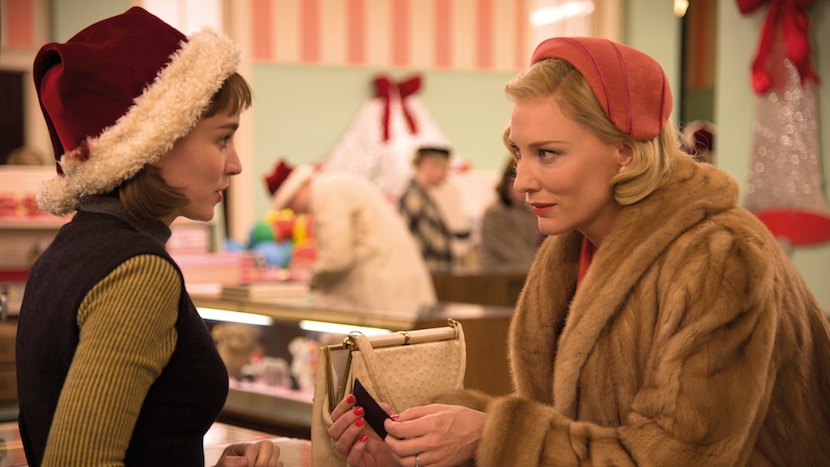Cautious.
Stories of intense romance are difficult to pin down critically, as their impact is more likely to be felt emotionally than intellectually. How much a viewer is affected by such movies is frequently personal or idiosyncratic, perhaps having to do with whether they’ve had an experience similar to the one portrayed on screen, or even fallen in love with someone who looks like one of the actors. So while the movie can meet or exceed certain objective quality benchmarks in terms of the filmmaking, its emotional impact tends to be highly subjective.
Such is the case with Todd Haynes’ Carol, a handsome portrait of two women falling in love in New York of the early 1950s, when such relationships were discussed in hushed tones if at all. Haynes has easily surpassed those technical benchmarks, as he does in each of his films. Yet his staid, restrained approach to the material leaves lots of empty space viewers may need to fill with their own experiences – or not, as the case may be.
It’s the eve of President Dwight D. Eisenhower’s 1953 inauguration, and it’s also Christmastime. Heretofore heterosexually inclined Therese (Rooney Mara) spots a customer shopping at the department store where she works, and finds she can’t take her eyes off her. When the woman (Cate Blanchett) notices the gaze, she seeks out Therese’s help on a present for her daughter, later introducing herself as Carol while taking Therese out to lunch as a thank you for returning a pair of gloves she left at the checkout counter. The women experience a palpable mutual attraction, one they don’t directly acknowledge as they make a series of plans to see one another again. Carol has some history in this arena, as her previous dalliances with members of the same sex have placed her on shaky legal ground as her estranged husband (Kyle Chandler) fights for custody of their daughter. Therese has her own interested suitor (Jake Lacy) whose proposal she has yet to accept. Despite the complications it will cause them both, Carol and Therese can’t stay away from one another, and are forced to consider just how far they’re willing to take their relationship.
Carol is familiar territory for Haynes, whose breakthrough film was Far From Heaven, also set in the 1950s and also dealing with closeted homosexuality, though it was a man in that case. He’s quite good in this comfort zone and his eye for period detail is immaculate. What makes Carol feel less bracing, however, is that it is precisely that: a comfort zone. After Far From Heaven, Haynes shook things up with the highly original musician biopic I’m Not There, in which Blanchett also appeared as one of a half-dozen versions of Bob Dylan. Add that to a film earlier on his CV, the psychological horror Safe, and you’ve got a filmmaker who seems – or at least seemed – keen to experiment. What’s missing from Carol is that sense of adventure. Haynes surprises us this time by not surprising us.
If this is well-worn ground for Haynes, so too is it for Blanchett and Mara. Blanchett has twice won Oscars for playing a variation on the type of aristocratic society woman she plays here, and it’s tempting to wonder if she seeks out that type of role too readily. Mara has also come to prominence playing the type of moon child she plays in Carol. Carol even describes Therese as being “flung from outer space,” which is surely the same thing David Fincher noticed when he cast Mara as the out-of-this-world Lisbeth Salander in The Girl With the Dragon Tattoo. So while both actresses do strong technical work that has already been rewarded with multiple nominations, it’s limited somewhat by feeling risk averse.
Which is a shame, because the characters themselves are taking huge risks. Carol is most effective when it contemplates the society in which these women lived, in which one could actually be prevented from seeing her daughter because of questions about her moral turpitude. As marriage equality is becoming the law of the land in some parts of the world, the time has never been better to celebrate the courage of those who tried to follow their hearts when the stakes were even more staggeringly high than they are today. Carol is too subtle or mature to come across as nearly so topical as that, though. This is a movie that explores the profundities of attraction in quiet moments. It puts forth the notion that a person’s sexuality is not fixed, but rather, is at any moment susceptible to a powerful chemical reaction between two people that cannot be rationally explained. Not unlike the powerful response a viewer feels toward a movie he or she loves, the presence of which can be just as inexplicable as its absence.
7/10
For more Reviews, click here. If you’re digging ReelGood, sign up to our mailing list for exclusive content, early reviews and chances to win big!


